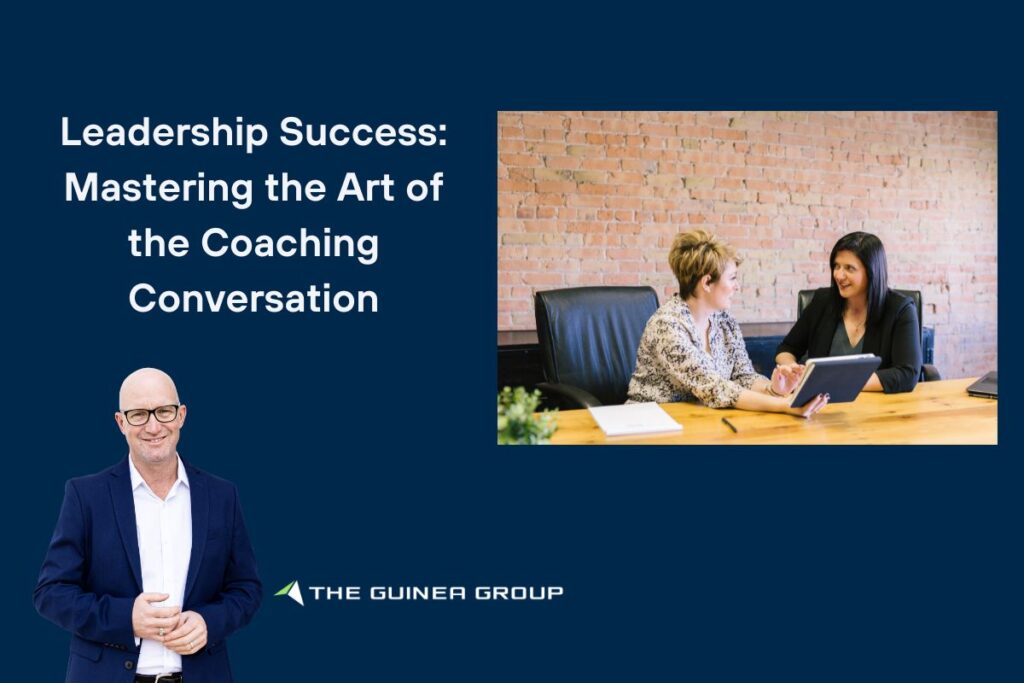Anton Guinea
Entrepreneur, Speaker, bestselling author, and founder of The Guinea Group of Companies. For over 15 years, Anton has helped leaders move their teams to become psychologically safe, physically safe and overall better versions of themselves.

Leadership Success: Mastering the Art of the Coaching Conversation

A number of our workshops recently, have included training for leaders on the art (skill) of conducting difficult conversations (or robust conversations, or courageous conversations, or whatever your organisation calls them).
It is such an important skill for leaders to work on. In my experience, it is the one thing that even the best leaders put off or avoid altogether. One CEO told me that he had put the conversation off because it could have been a relationship ending conversation.
And that might very well have happened. Though with the right skills, and with a focus on coaching, rather than ‘robusting’ per se, you can excel at these conversations. My take on these conversations are – it is not fair not to have them … and that leaders who excel at coaching conversations are better equipped to navigate challenges with the teams, foster collaboration, and unlock the full potential of their team members. Here are three key elements to consider when aiming to conduct impactful coaching conversations:
1. Active Listening: The Power of Presence
One of the cornerstones of effective coaching conversations is the ability to listen actively. It’s not just about hearing words; it’s about understanding the underlying emotions, motivations, and perspectives. Practice being fully present in the moment, set aside distractions, and demonstrate genuine curiosity.
By actively listening, you not only gain a deeper understanding of your team members but also create an environment where they feel heard and valued.
2. Powerful Questioning: Unleashing Insight
Great coaching conversations are driven by thought-provoking questions. Instead of providing all the answers, encourage your team members to explore their own insights and solutions. Ask open-ended questions that prompt reflection and critical thinking.
This not only empowers individuals to take ownership of their development but also fosters a culture of continuous learning and growth within your team.
3. Constructive Feedback: Nurturing Growth
Providing feedback is a crucial aspect of coaching conversations. However, the key lies in delivering feedback constructively. Focus on specific behaviours, highlight strengths, and offer actionable suggestions for improvement. Create a safe space for open dialogue, emphasising a growth mindset that views challenges as opportunities for development.
When feedback is delivered with empathy and a commitment to support individual growth, it becomes a catalyst for positive change.
Remember, the best coaching conversations are a two-way street. As leaders, our role is to guide, empower, and inspire. By mastering active listening, powerful questioning, and constructive feedback, we can create an environment where our teams thrive, innovation flourishes, and collective success becomes inevitable.
Let’s continue to learn, grow, and lead with purpose. Share your thoughts on conducting great coaching conversations in the comments below. What strategies have worked well for you?
And please click the image below if you’d like to chat about what leadership means to you.
If you would like to learn more about Anton or The Guinea Group, please click here to book into Anton’s calendar, to:
UPGRADE your Mindset
UPSKILL your Leadership
UPLIFT your Teams
About Anton
Anton has dedicated his working life to helping leaders to upgrade their mindset, upskill their leadership, and uplift their teams! With a focus on helps leaders to better lead under pressure. Anton is an entrepreneur, speaker, consultant, bestselling author and founder of The Guinea Group. Over the past 19 years, Anton has worked with over 175+ global organisations, he has inspired workplace leadership, safety, and cultural change. He’s achieved this by combining his corporate expertise, education (Bachelor of HR and Psychology), and infectious energy levels.
Work With Anton!
Subscribe to our Newsletter
